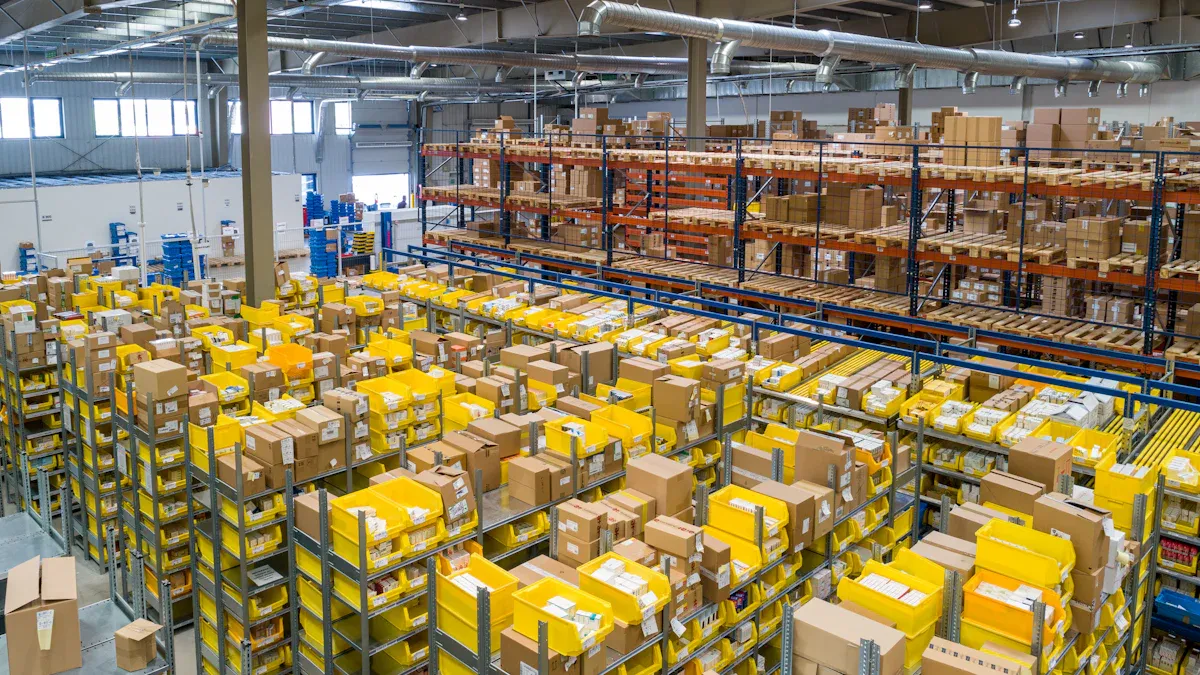How Data Center Logistics Can Power Your Supply Chain

Understanding Data Center Logistics
Core Components of Data Center Logistics
Data center logistics revolves around several critical components that ensure seamless operations. Hardware management plays a pivotal role in maintaining the functionality of servers and other essential equipment. Effective cooling systems are equally important, as they regulate the heat generated by hardware and prevent overheating. Advanced technologies like immersion and liquid cooling enhance energy efficiency, achieving low Power Usage Effectiveness (PUE) values.
Redundancy is another cornerstone of data center construction. It ensures operational continuity by providing backup systems for power, cooling, and network connectivity. This reliability is vital for uninterrupted supply chain management. Additionally, secure data erasure and responsible disposal of outdated equipment safeguard sensitive information while adhering to environmental standards.
The Role of Technology in Data Center Logistics
Technology drives efficiency and innovation in data logistics. Real-time analytics provide actionable insights, enabling better decision-making in supply chain management. Fleet tracking and monitoring, powered by GPS and IoT technologies, optimize route planning and reduce fuel consumption. Data-driven route optimization also lowers CO2 emissions, improving delivery timelines and driver satisfaction.
Warehouse management benefits from advanced analytics, which identify underutilized spaces and maximize storage efficiency. Real-time inventory tracking ensures strategic stock placement, aligning inventory with market demands. These technological advancements enhance visibility across the supply chain, fostering proactive management and operational excellence.
How Data Center Logistics Enhances Supply Chain Resilience
Data center logistics strengthens supply chain resilience by integrating advanced cloud solutions and predictive analytics. Demand forecasting, powered by machine learning, aligns inventory with market needs, reducing wastage and ensuring timely availability of resources. Centralized storage for logistical data enhances operational efficiency, while real-time updates improve visibility into inventory and shipment progress.
Cloud solutions play a transformative role in modern supply chain management. They enable scalability, allowing businesses to adapt to fluctuating demands. Cloud data centers also support seamless data sharing and collaboration, ensuring continuity during disruptions. By leveraging these capabilities, organizations can build robust supply chains that withstand challenges and maintain efficiency.
Benefits of Integrating Data Center Logistics into Your Supply Chain

Improved Efficiency and Cost Savings
Data logistics transforms modern supply chains by enhancing efficiency, scalability, and cost savings. Centralized data storage improves collaboration, while real-time analytics optimize decision-making. The table below highlights key benefits:
Benefit | Description |
|---|---|
Data Storage and Management | Centralized storage for logistical data enhances collaboration and operational efficiency. |
Real-time Analytics | Provides actionable insights for decision-making, improving supply chain performance. |
Fleet Tracking and Monitoring | Optimizes route planning and reduces fuel consumption through GPS and IoT technologies. |
Demand Forecasting | Uses machine learning to predict future demand, aligning inventory with market needs. |
Supply Chain Visibility | Aggregates data for real-time updates, enhancing transparency and customer satisfaction. |
Partnering with YQN Logistics ensures expert support in implementing these solutions. Unlock your supply chain’s potential today.
Real-World Examples of Success
Numerous companies have achieved remarkable results by integrating data supply chain. For instance, a leading e-commerce giant utilized cloud supply chain solutions to optimize its global operations. By adopting renewable energy-powered data centers, the company reduced its energy consumption by 30% while improving delivery timelines.
Another example involves a tech firm specializing in AI. The organization implemented energy-efficient cooling systems in its data centers, achieving significant cost savings. These measures also enhanced the company’s ability to scale operations during peak demand periods.
These success stories highlight the transformative potential of data logistics. They demonstrate how businesses can achieve operational excellence while prioritizing sustainability.
How to Implement Data Center Logistics in Your Business
Adopt Advanced Technology Solutions
Implementing advanced technology solutions is essential for optimizing data logistics. These technologies streamline operations and deliver measurable benefits. For example, companies like Amazon use advanced algorithms to optimize inventory distribution, which reduces transportation costs and improves delivery times. Fleet tracking systems powered by GPS and IoT technologies enhance route planning, minimizing fuel consumption and ensuring timely deliveries. Demand forecasting tools, driven by machine learning, align inventory levels with market needs, reducing waste and excess stock by up to 20%.
Benefit | Description |
|---|---|
Fleet Tracking | Optimizes route planning and reduces fuel consumption through GPS and IoT technologies. |
Demand Forecasting | Predicts future demand using machine learning, reducing excess stock and waste. |
Supply Chain Visibility | Provides real-time updates on inventory and shipment progress, enhancing customer satisfaction. |
Inventory Optimization | Reduces transportation costs and improves delivery times through strategic inventory distribution. |
These solutions not only improve operational efficiency but also contribute to cost savings and sustainability.
Optimize Vendor Relationships for Resilience
Strong vendor relationships are critical for building a resilient supply chain. Businesses should focus on vendor diversification to reduce dependency on a single supplier. This approach mitigates risks associated with supply disruptions. Collaborative partnerships with vendors ensure timely delivery of critical components, such as servers and cooling systems, which are vital for data center operations. Clear communication and shared goals between businesses and vendors enhance trust and reliability, fostering long-term success.
Leverage Data Analytics for Proactive Decision-Making
Data analytics plays a transformative role in proactive decision-making. It identifies inefficiencies and uncovers cost-saving opportunities within the supply chain. Real-time insights improve operational efficiency by enabling businesses to anticipate customer needs and adjust logistics accordingly. Enhanced visibility into inventory levels ensures better management and reduces unnecessary costs. Demand sensing, powered by analytics, aligns inventory with market trends, ensuring resources are available when needed. These capabilities empower organizations to make informed decisions and maintain a competitive edge.
FAQ
What is the role of data integration in data center logistics?
Data integration ensures seamless communication between systems, enabling efficient inventory management and real-time updates. It enhances operational visibility and supports proactive decision-making.
How does cloud integration improve supply chain management?
Cloud integration enables centralized data storage and real-time collaboration. It enhances scalability, reduces supply chain risks, and supports digital transformation for businesses adapting to dynamic market demands.
Can data supply chain help mitigate logistics risks?
Yes, it strengthens supply chain resilience by leveraging predictive analytics and redundancy planning. These measures ensure continuity during disruptions and reduce operational vulnerabilities.
See Also
Enhancing Global Logistics For A Top Robotics Warehouse
YQN Triumphs Over Red Sea Delays In Auto Logistics
2024 Shipping Industry Trends: Insights And 2025 Predictions

Shipping with YQN - Global Logistics at Your Fingertips
YQN has established subsidiaries worldwide, covering North America, Latin America, Southeast Asia, and the Middle East. We have partnered with 300+ top shipping and airline companies and have access to 3500+ high-quality supplier resources. YQN also has a professional customer service and fulfillment team of over 500 people to provide more worry-free and efficient international logistics services.
Contact Us
You can also email us at info@yqn.com.

